Global Business Assignment Report: Toyota, Globalization, and Brexit
VerifiedAdded on 2023/06/09
|10
|2318
|445
Report
AI Summary
This report provides a comprehensive analysis of the global business environment, focusing on the impacts of globalization and Brexit. Part A delves into the definition of globalization, its various forces, and its effects on businesses, including the benefits and costs associated with it. The report uses Toyota as a case study, examining how the company has navigated the challenges and opportunities presented by globalization, including its strategies for international expansion, competition, and the impact of economic factors in different countries. Part B shifts the focus to Brexit, exploring its implications for the UK business sector, including the attractiveness of the UK for foreign investment and the positive and negative impacts of leaving the European Union. The report concludes by summarizing the key findings, highlighting the complex interplay between globalization, political events, and the strategic decisions of multinational corporations.
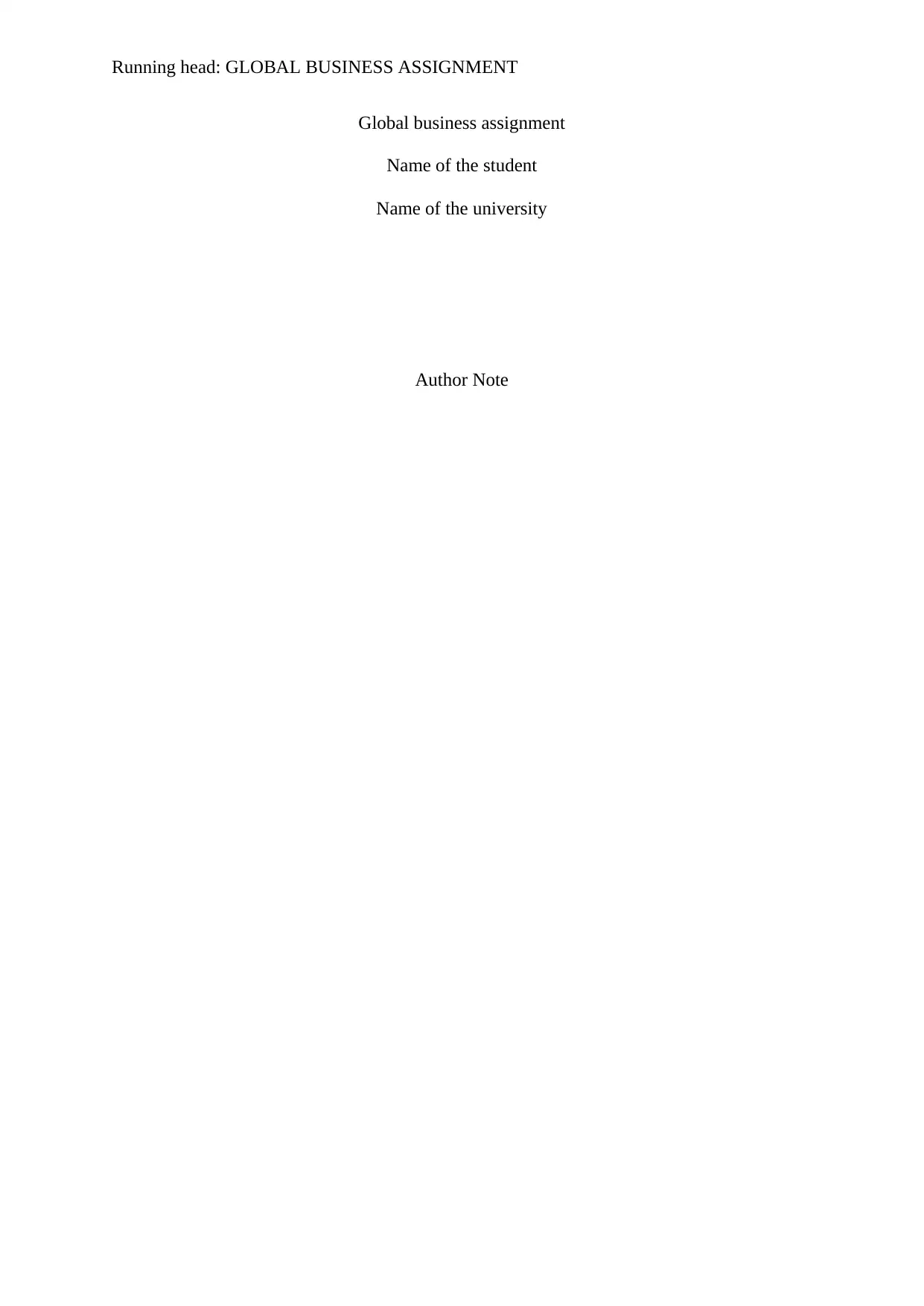
Running head: GLOBAL BUSINESS ASSIGNMENT
Global business assignment
Name of the student
Name of the university
Author Note
Global business assignment
Name of the student
Name of the university
Author Note
Paraphrase This Document
Need a fresh take? Get an instant paraphrase of this document with our AI Paraphraser
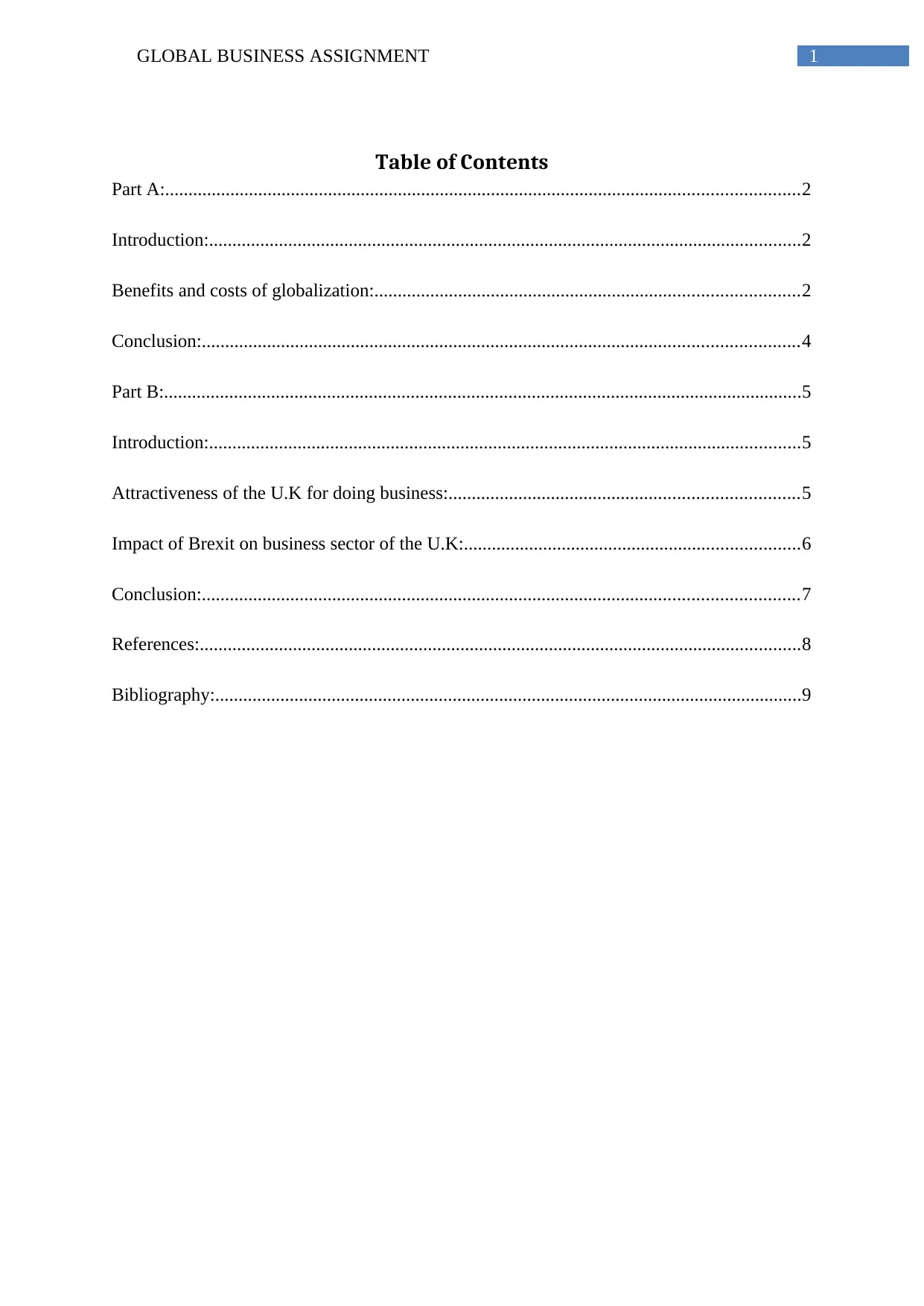
1GLOBAL BUSINESS ASSIGNMENT
Table of Contents
Part A:........................................................................................................................................2
Introduction:...............................................................................................................................2
Benefits and costs of globalization:...........................................................................................2
Conclusion:................................................................................................................................4
Part B:.........................................................................................................................................5
Introduction:...............................................................................................................................5
Attractiveness of the U.K for doing business:...........................................................................5
Impact of Brexit on business sector of the U.K:........................................................................6
Conclusion:................................................................................................................................7
References:.................................................................................................................................8
Bibliography:..............................................................................................................................9
Table of Contents
Part A:........................................................................................................................................2
Introduction:...............................................................................................................................2
Benefits and costs of globalization:...........................................................................................2
Conclusion:................................................................................................................................4
Part B:.........................................................................................................................................5
Introduction:...............................................................................................................................5
Attractiveness of the U.K for doing business:...........................................................................5
Impact of Brexit on business sector of the U.K:........................................................................6
Conclusion:................................................................................................................................7
References:.................................................................................................................................8
Bibliography:..............................................................................................................................9
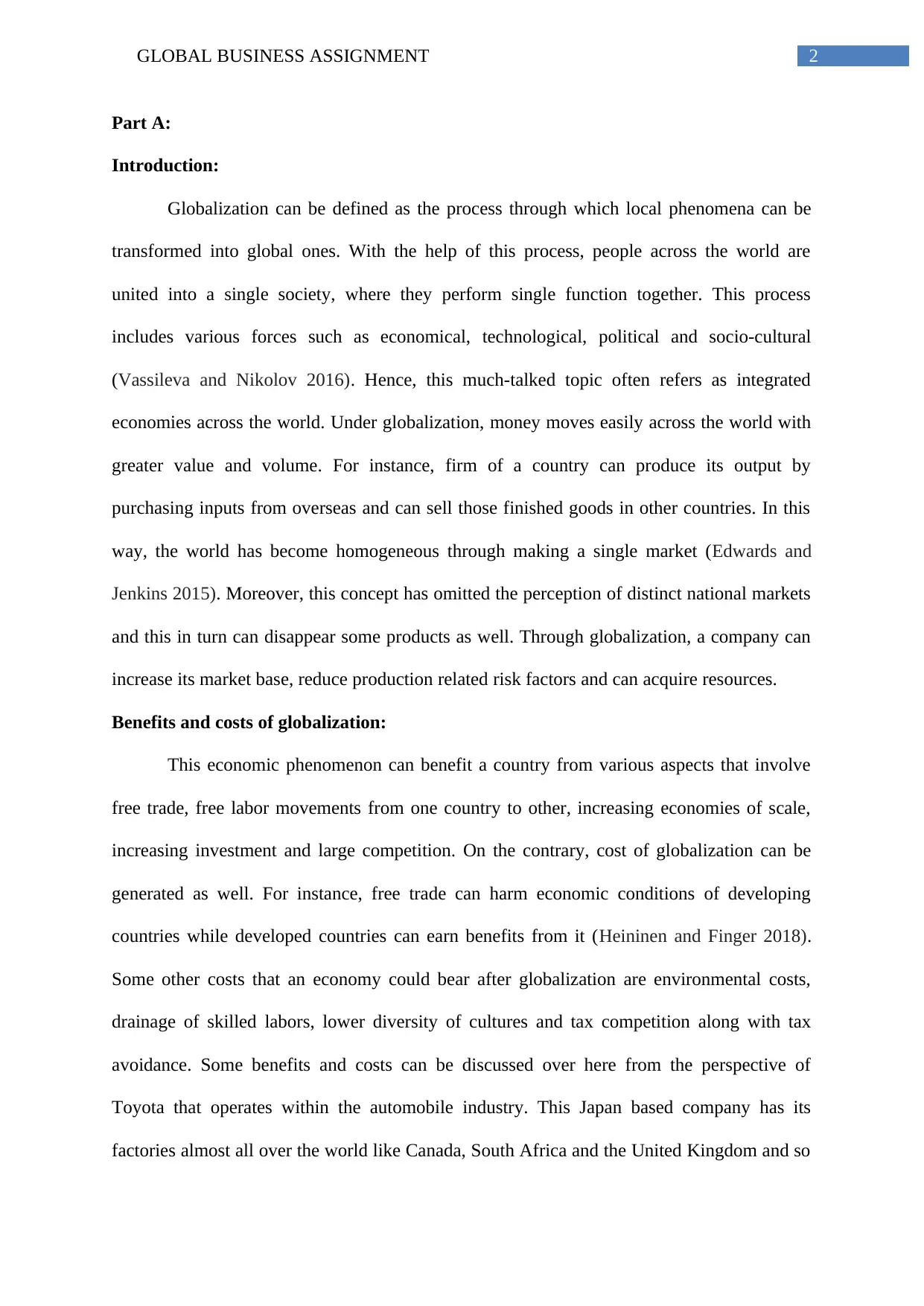
2GLOBAL BUSINESS ASSIGNMENT
Part A:
Introduction:
Globalization can be defined as the process through which local phenomena can be
transformed into global ones. With the help of this process, people across the world are
united into a single society, where they perform single function together. This process
includes various forces such as economical, technological, political and socio-cultural
(Vassileva and Nikolov 2016). Hence, this much-talked topic often refers as integrated
economies across the world. Under globalization, money moves easily across the world with
greater value and volume. For instance, firm of a country can produce its output by
purchasing inputs from overseas and can sell those finished goods in other countries. In this
way, the world has become homogeneous through making a single market (Edwards and
Jenkins 2015). Moreover, this concept has omitted the perception of distinct national markets
and this in turn can disappear some products as well. Through globalization, a company can
increase its market base, reduce production related risk factors and can acquire resources.
Benefits and costs of globalization:
This economic phenomenon can benefit a country from various aspects that involve
free trade, free labor movements from one country to other, increasing economies of scale,
increasing investment and large competition. On the contrary, cost of globalization can be
generated as well. For instance, free trade can harm economic conditions of developing
countries while developed countries can earn benefits from it (Heininen and Finger 2018).
Some other costs that an economy could bear after globalization are environmental costs,
drainage of skilled labors, lower diversity of cultures and tax competition along with tax
avoidance. Some benefits and costs can be discussed over here from the perspective of
Toyota that operates within the automobile industry. This Japan based company has its
factories almost all over the world like Canada, South Africa and the United Kingdom and so
Part A:
Introduction:
Globalization can be defined as the process through which local phenomena can be
transformed into global ones. With the help of this process, people across the world are
united into a single society, where they perform single function together. This process
includes various forces such as economical, technological, political and socio-cultural
(Vassileva and Nikolov 2016). Hence, this much-talked topic often refers as integrated
economies across the world. Under globalization, money moves easily across the world with
greater value and volume. For instance, firm of a country can produce its output by
purchasing inputs from overseas and can sell those finished goods in other countries. In this
way, the world has become homogeneous through making a single market (Edwards and
Jenkins 2015). Moreover, this concept has omitted the perception of distinct national markets
and this in turn can disappear some products as well. Through globalization, a company can
increase its market base, reduce production related risk factors and can acquire resources.
Benefits and costs of globalization:
This economic phenomenon can benefit a country from various aspects that involve
free trade, free labor movements from one country to other, increasing economies of scale,
increasing investment and large competition. On the contrary, cost of globalization can be
generated as well. For instance, free trade can harm economic conditions of developing
countries while developed countries can earn benefits from it (Heininen and Finger 2018).
Some other costs that an economy could bear after globalization are environmental costs,
drainage of skilled labors, lower diversity of cultures and tax competition along with tax
avoidance. Some benefits and costs can be discussed over here from the perspective of
Toyota that operates within the automobile industry. This Japan based company has its
factories almost all over the world like Canada, South Africa and the United Kingdom and so
⊘ This is a preview!⊘
Do you want full access?
Subscribe today to unlock all pages.

Trusted by 1+ million students worldwide
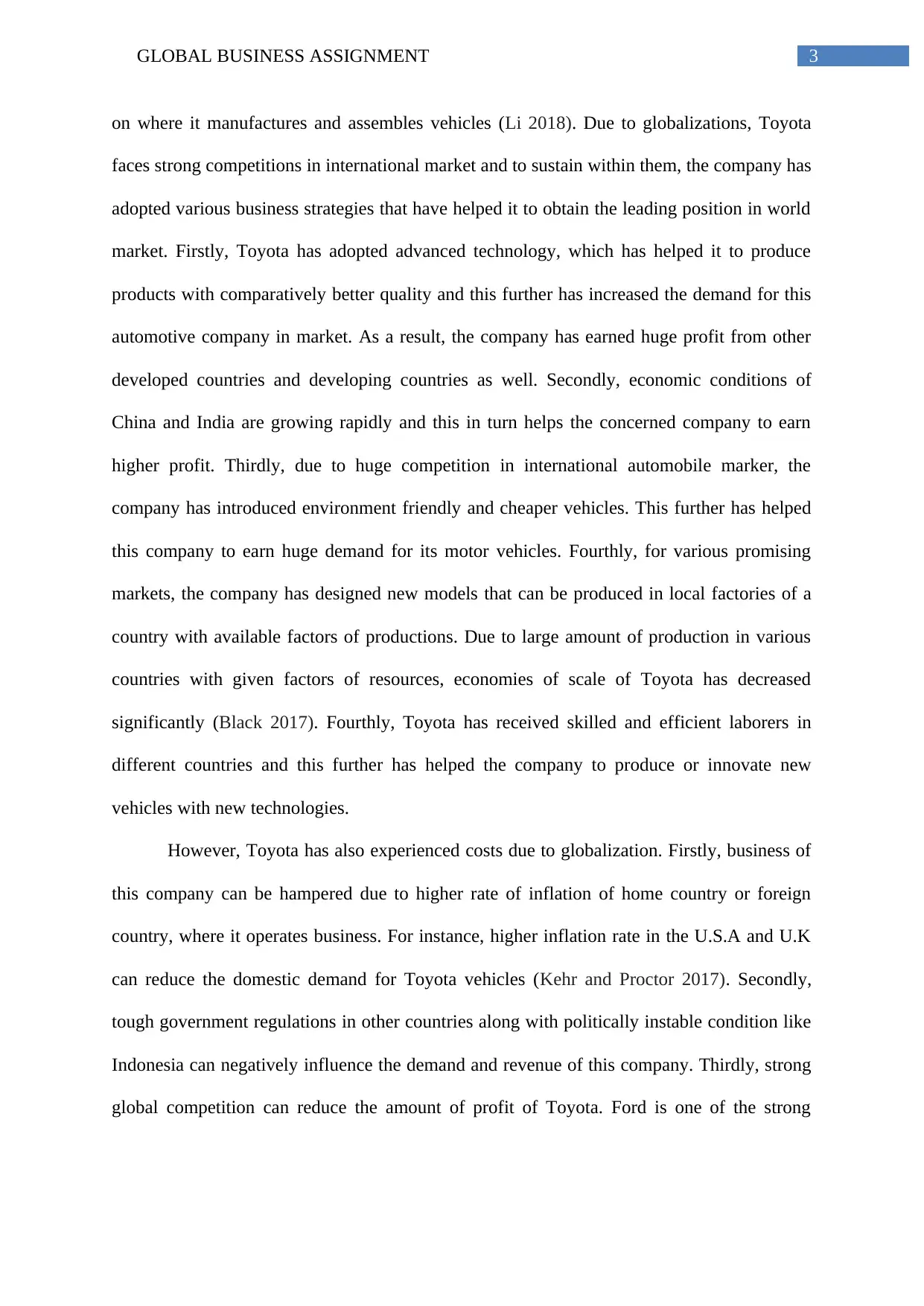
3GLOBAL BUSINESS ASSIGNMENT
on where it manufactures and assembles vehicles (Li 2018). Due to globalizations, Toyota
faces strong competitions in international market and to sustain within them, the company has
adopted various business strategies that have helped it to obtain the leading position in world
market. Firstly, Toyota has adopted advanced technology, which has helped it to produce
products with comparatively better quality and this further has increased the demand for this
automotive company in market. As a result, the company has earned huge profit from other
developed countries and developing countries as well. Secondly, economic conditions of
China and India are growing rapidly and this in turn helps the concerned company to earn
higher profit. Thirdly, due to huge competition in international automobile marker, the
company has introduced environment friendly and cheaper vehicles. This further has helped
this company to earn huge demand for its motor vehicles. Fourthly, for various promising
markets, the company has designed new models that can be produced in local factories of a
country with available factors of productions. Due to large amount of production in various
countries with given factors of resources, economies of scale of Toyota has decreased
significantly (Black 2017). Fourthly, Toyota has received skilled and efficient laborers in
different countries and this further has helped the company to produce or innovate new
vehicles with new technologies.
However, Toyota has also experienced costs due to globalization. Firstly, business of
this company can be hampered due to higher rate of inflation of home country or foreign
country, where it operates business. For instance, higher inflation rate in the U.S.A and U.K
can reduce the domestic demand for Toyota vehicles (Kehr and Proctor 2017). Secondly,
tough government regulations in other countries along with politically instable condition like
Indonesia can negatively influence the demand and revenue of this company. Thirdly, strong
global competition can reduce the amount of profit of Toyota. Ford is one of the strong
on where it manufactures and assembles vehicles (Li 2018). Due to globalizations, Toyota
faces strong competitions in international market and to sustain within them, the company has
adopted various business strategies that have helped it to obtain the leading position in world
market. Firstly, Toyota has adopted advanced technology, which has helped it to produce
products with comparatively better quality and this further has increased the demand for this
automotive company in market. As a result, the company has earned huge profit from other
developed countries and developing countries as well. Secondly, economic conditions of
China and India are growing rapidly and this in turn helps the concerned company to earn
higher profit. Thirdly, due to huge competition in international automobile marker, the
company has introduced environment friendly and cheaper vehicles. This further has helped
this company to earn huge demand for its motor vehicles. Fourthly, for various promising
markets, the company has designed new models that can be produced in local factories of a
country with available factors of productions. Due to large amount of production in various
countries with given factors of resources, economies of scale of Toyota has decreased
significantly (Black 2017). Fourthly, Toyota has received skilled and efficient laborers in
different countries and this further has helped the company to produce or innovate new
vehicles with new technologies.
However, Toyota has also experienced costs due to globalization. Firstly, business of
this company can be hampered due to higher rate of inflation of home country or foreign
country, where it operates business. For instance, higher inflation rate in the U.S.A and U.K
can reduce the domestic demand for Toyota vehicles (Kehr and Proctor 2017). Secondly,
tough government regulations in other countries along with politically instable condition like
Indonesia can negatively influence the demand and revenue of this company. Thirdly, strong
global competition can reduce the amount of profit of Toyota. Ford is one of the strong
Paraphrase This Document
Need a fresh take? Get an instant paraphrase of this document with our AI Paraphraser
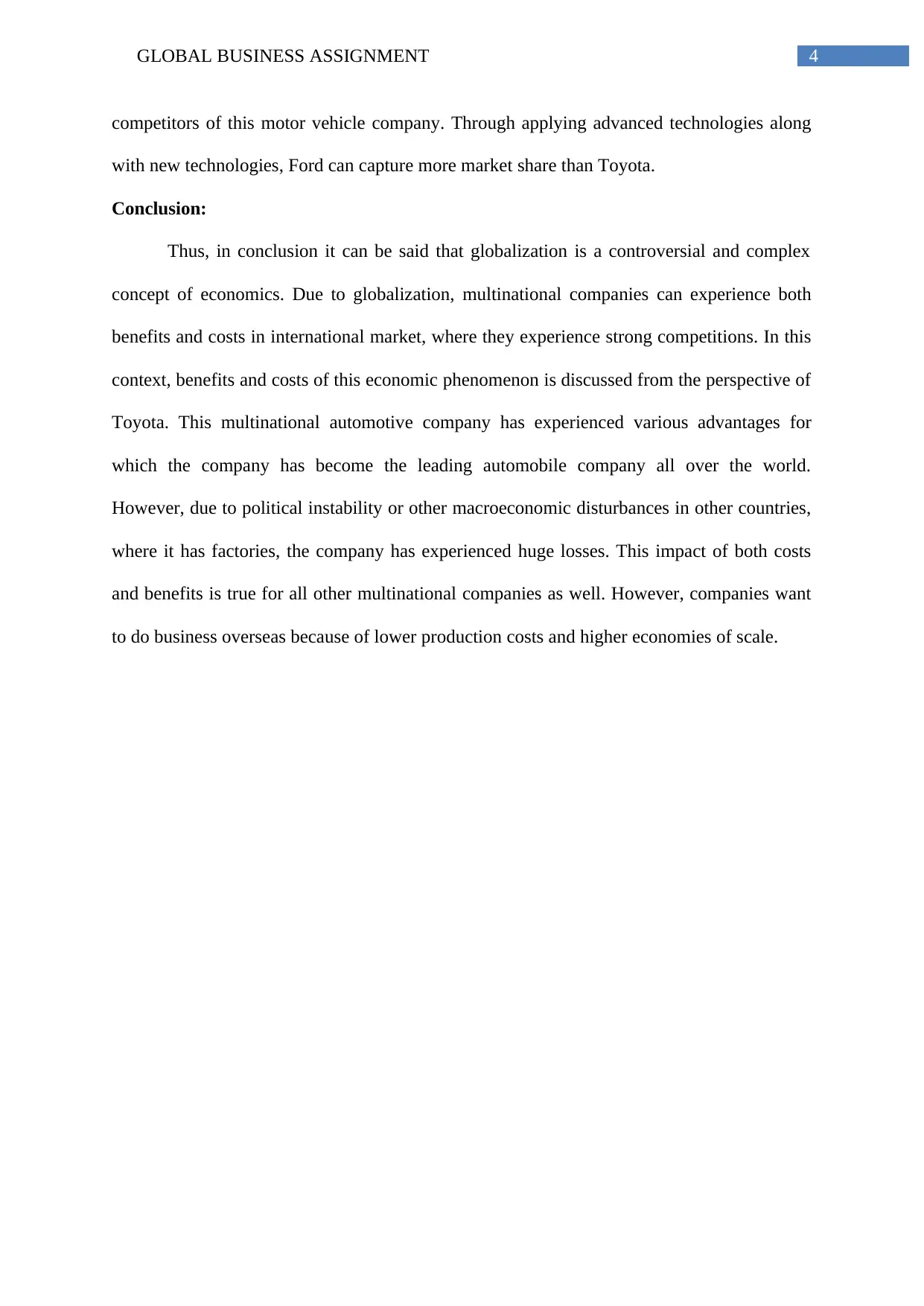
4GLOBAL BUSINESS ASSIGNMENT
competitors of this motor vehicle company. Through applying advanced technologies along
with new technologies, Ford can capture more market share than Toyota.
Conclusion:
Thus, in conclusion it can be said that globalization is a controversial and complex
concept of economics. Due to globalization, multinational companies can experience both
benefits and costs in international market, where they experience strong competitions. In this
context, benefits and costs of this economic phenomenon is discussed from the perspective of
Toyota. This multinational automotive company has experienced various advantages for
which the company has become the leading automobile company all over the world.
However, due to political instability or other macroeconomic disturbances in other countries,
where it has factories, the company has experienced huge losses. This impact of both costs
and benefits is true for all other multinational companies as well. However, companies want
to do business overseas because of lower production costs and higher economies of scale.
competitors of this motor vehicle company. Through applying advanced technologies along
with new technologies, Ford can capture more market share than Toyota.
Conclusion:
Thus, in conclusion it can be said that globalization is a controversial and complex
concept of economics. Due to globalization, multinational companies can experience both
benefits and costs in international market, where they experience strong competitions. In this
context, benefits and costs of this economic phenomenon is discussed from the perspective of
Toyota. This multinational automotive company has experienced various advantages for
which the company has become the leading automobile company all over the world.
However, due to political instability or other macroeconomic disturbances in other countries,
where it has factories, the company has experienced huge losses. This impact of both costs
and benefits is true for all other multinational companies as well. However, companies want
to do business overseas because of lower production costs and higher economies of scale.
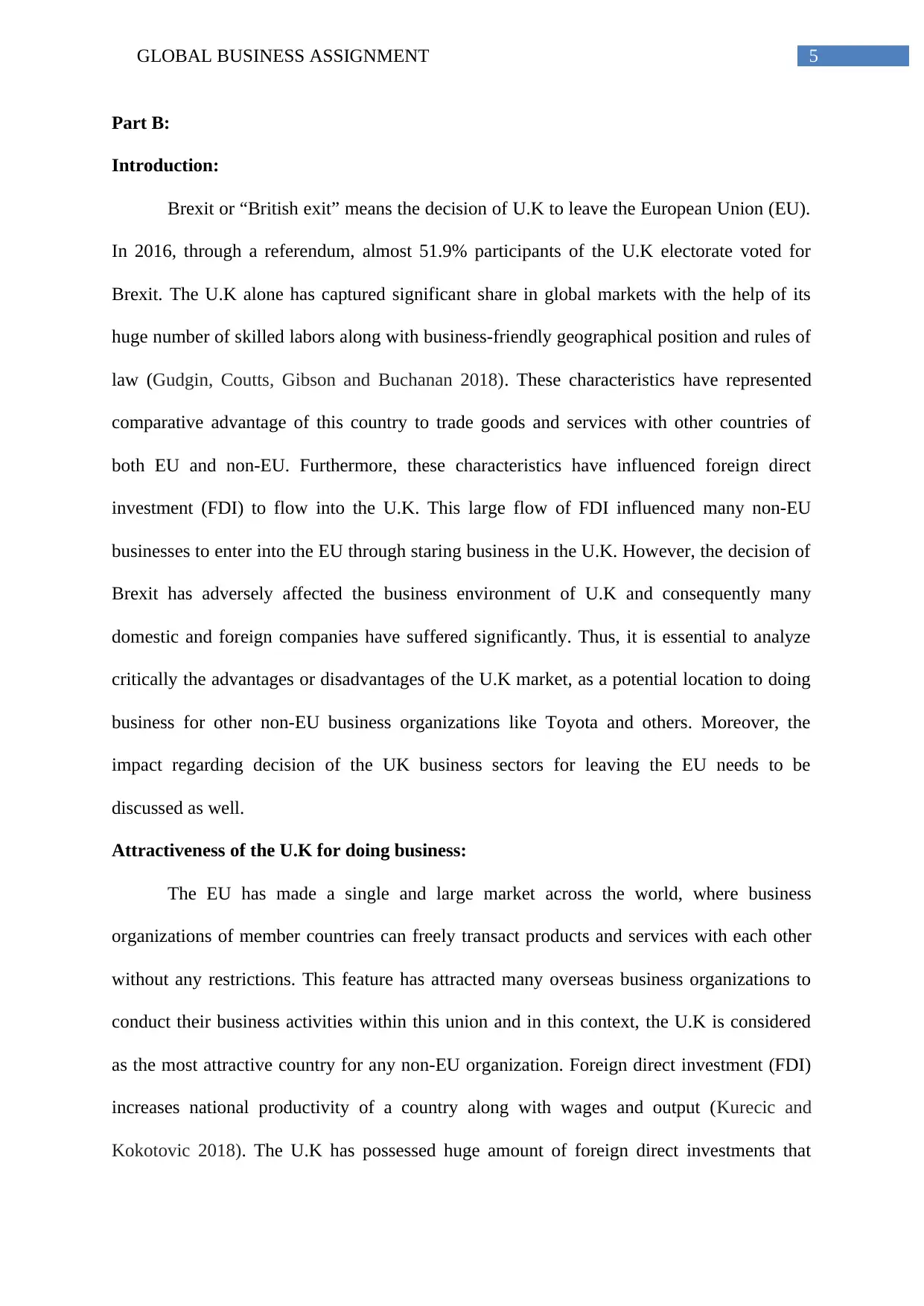
5GLOBAL BUSINESS ASSIGNMENT
Part B:
Introduction:
Brexit or “British exit” means the decision of U.K to leave the European Union (EU).
In 2016, through a referendum, almost 51.9% participants of the U.K electorate voted for
Brexit. The U.K alone has captured significant share in global markets with the help of its
huge number of skilled labors along with business-friendly geographical position and rules of
law (Gudgin, Coutts, Gibson and Buchanan 2018). These characteristics have represented
comparative advantage of this country to trade goods and services with other countries of
both EU and non-EU. Furthermore, these characteristics have influenced foreign direct
investment (FDI) to flow into the U.K. This large flow of FDI influenced many non-EU
businesses to enter into the EU through staring business in the U.K. However, the decision of
Brexit has adversely affected the business environment of U.K and consequently many
domestic and foreign companies have suffered significantly. Thus, it is essential to analyze
critically the advantages or disadvantages of the U.K market, as a potential location to doing
business for other non-EU business organizations like Toyota and others. Moreover, the
impact regarding decision of the UK business sectors for leaving the EU needs to be
discussed as well.
Attractiveness of the U.K for doing business:
The EU has made a single and large market across the world, where business
organizations of member countries can freely transact products and services with each other
without any restrictions. This feature has attracted many overseas business organizations to
conduct their business activities within this union and in this context, the U.K is considered
as the most attractive country for any non-EU organization. Foreign direct investment (FDI)
increases national productivity of a country along with wages and output (Kurecic and
Kokotovic 2018). The U.K has possessed huge amount of foreign direct investments that
Part B:
Introduction:
Brexit or “British exit” means the decision of U.K to leave the European Union (EU).
In 2016, through a referendum, almost 51.9% participants of the U.K electorate voted for
Brexit. The U.K alone has captured significant share in global markets with the help of its
huge number of skilled labors along with business-friendly geographical position and rules of
law (Gudgin, Coutts, Gibson and Buchanan 2018). These characteristics have represented
comparative advantage of this country to trade goods and services with other countries of
both EU and non-EU. Furthermore, these characteristics have influenced foreign direct
investment (FDI) to flow into the U.K. This large flow of FDI influenced many non-EU
businesses to enter into the EU through staring business in the U.K. However, the decision of
Brexit has adversely affected the business environment of U.K and consequently many
domestic and foreign companies have suffered significantly. Thus, it is essential to analyze
critically the advantages or disadvantages of the U.K market, as a potential location to doing
business for other non-EU business organizations like Toyota and others. Moreover, the
impact regarding decision of the UK business sectors for leaving the EU needs to be
discussed as well.
Attractiveness of the U.K for doing business:
The EU has made a single and large market across the world, where business
organizations of member countries can freely transact products and services with each other
without any restrictions. This feature has attracted many overseas business organizations to
conduct their business activities within this union and in this context, the U.K is considered
as the most attractive country for any non-EU organization. Foreign direct investment (FDI)
increases national productivity of a country along with wages and output (Kurecic and
Kokotovic 2018). The U.K has possessed huge amount of foreign direct investments that
⊘ This is a preview!⊘
Do you want full access?
Subscribe today to unlock all pages.

Trusted by 1+ million students worldwide
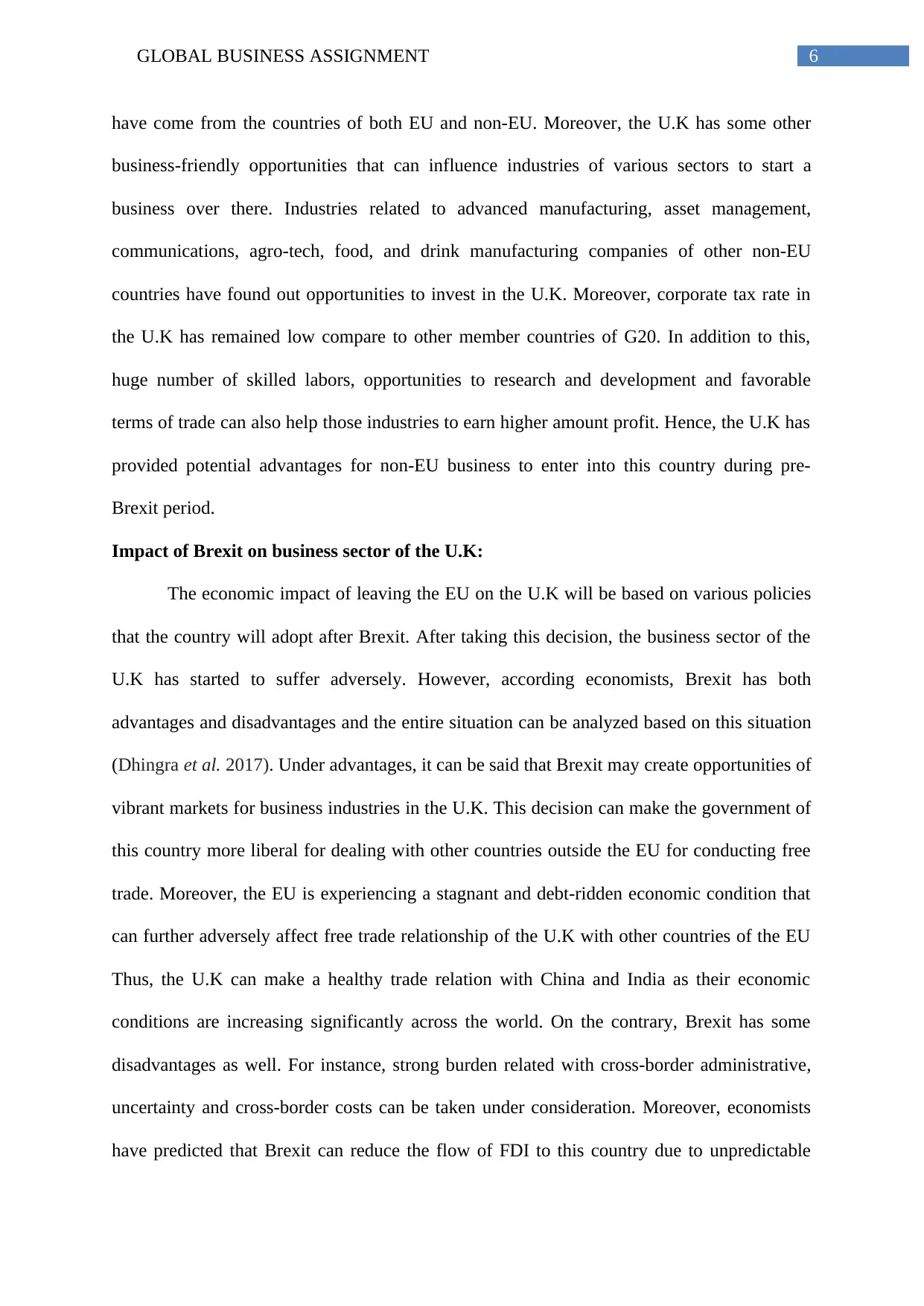
6GLOBAL BUSINESS ASSIGNMENT
have come from the countries of both EU and non-EU. Moreover, the U.K has some other
business-friendly opportunities that can influence industries of various sectors to start a
business over there. Industries related to advanced manufacturing, asset management,
communications, agro-tech, food, and drink manufacturing companies of other non-EU
countries have found out opportunities to invest in the U.K. Moreover, corporate tax rate in
the U.K has remained low compare to other member countries of G20. In addition to this,
huge number of skilled labors, opportunities to research and development and favorable
terms of trade can also help those industries to earn higher amount profit. Hence, the U.K has
provided potential advantages for non-EU business to enter into this country during pre-
Brexit period.
Impact of Brexit on business sector of the U.K:
The economic impact of leaving the EU on the U.K will be based on various policies
that the country will adopt after Brexit. After taking this decision, the business sector of the
U.K has started to suffer adversely. However, according economists, Brexit has both
advantages and disadvantages and the entire situation can be analyzed based on this situation
(Dhingra et al. 2017). Under advantages, it can be said that Brexit may create opportunities of
vibrant markets for business industries in the U.K. This decision can make the government of
this country more liberal for dealing with other countries outside the EU for conducting free
trade. Moreover, the EU is experiencing a stagnant and debt-ridden economic condition that
can further adversely affect free trade relationship of the U.K with other countries of the EU
Thus, the U.K can make a healthy trade relation with China and India as their economic
conditions are increasing significantly across the world. On the contrary, Brexit has some
disadvantages as well. For instance, strong burden related with cross-border administrative,
uncertainty and cross-border costs can be taken under consideration. Moreover, economists
have predicted that Brexit can reduce the flow of FDI to this country due to unpredictable
have come from the countries of both EU and non-EU. Moreover, the U.K has some other
business-friendly opportunities that can influence industries of various sectors to start a
business over there. Industries related to advanced manufacturing, asset management,
communications, agro-tech, food, and drink manufacturing companies of other non-EU
countries have found out opportunities to invest in the U.K. Moreover, corporate tax rate in
the U.K has remained low compare to other member countries of G20. In addition to this,
huge number of skilled labors, opportunities to research and development and favorable
terms of trade can also help those industries to earn higher amount profit. Hence, the U.K has
provided potential advantages for non-EU business to enter into this country during pre-
Brexit period.
Impact of Brexit on business sector of the U.K:
The economic impact of leaving the EU on the U.K will be based on various policies
that the country will adopt after Brexit. After taking this decision, the business sector of the
U.K has started to suffer adversely. However, according economists, Brexit has both
advantages and disadvantages and the entire situation can be analyzed based on this situation
(Dhingra et al. 2017). Under advantages, it can be said that Brexit may create opportunities of
vibrant markets for business industries in the U.K. This decision can make the government of
this country more liberal for dealing with other countries outside the EU for conducting free
trade. Moreover, the EU is experiencing a stagnant and debt-ridden economic condition that
can further adversely affect free trade relationship of the U.K with other countries of the EU
Thus, the U.K can make a healthy trade relation with China and India as their economic
conditions are increasing significantly across the world. On the contrary, Brexit has some
disadvantages as well. For instance, strong burden related with cross-border administrative,
uncertainty and cross-border costs can be taken under consideration. Moreover, economists
have predicted that Brexit can reduce the flow of FDI to this country due to unpredictable
Paraphrase This Document
Need a fresh take? Get an instant paraphrase of this document with our AI Paraphraser
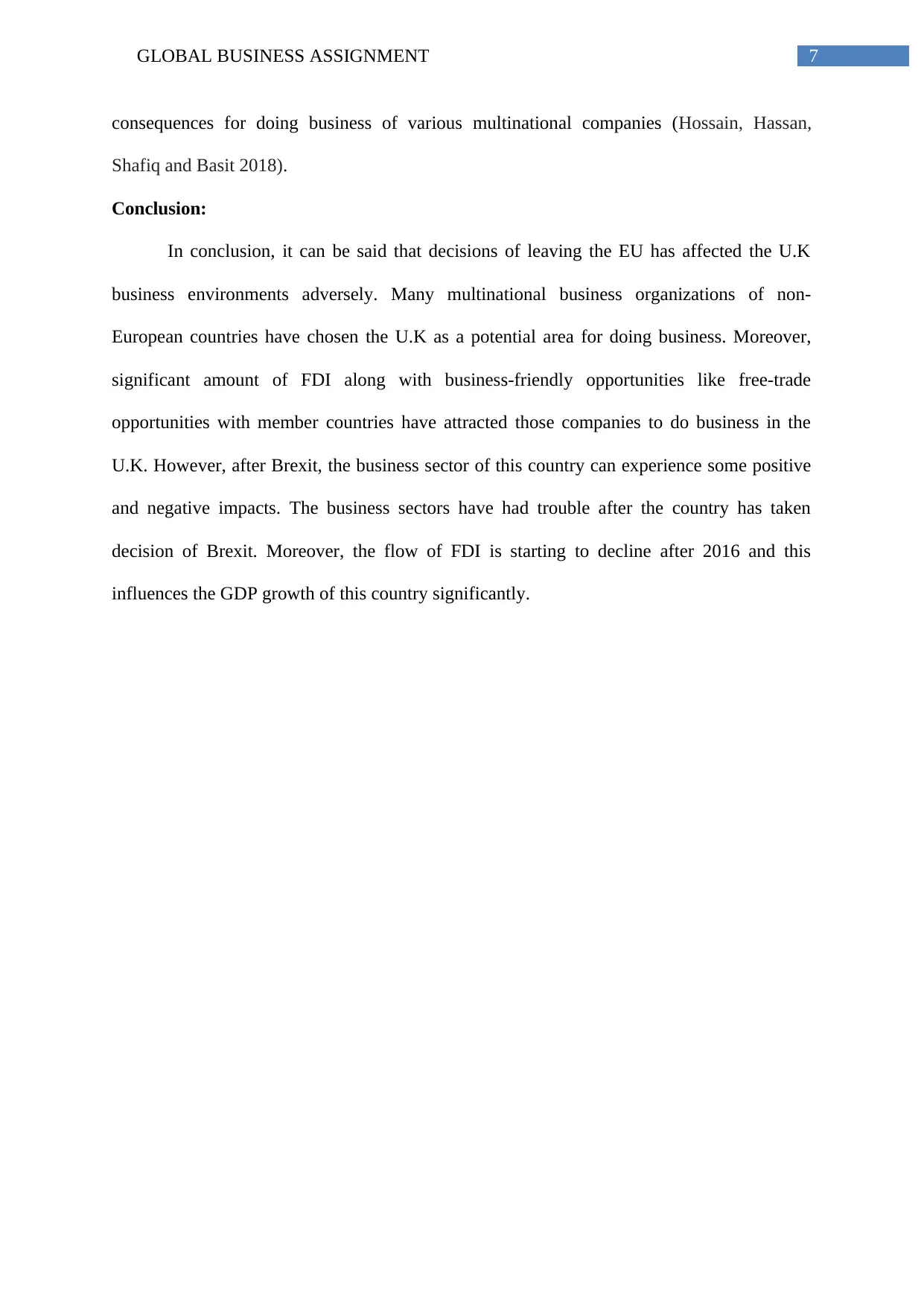
7GLOBAL BUSINESS ASSIGNMENT
consequences for doing business of various multinational companies (Hossain, Hassan,
Shafiq and Basit 2018).
Conclusion:
In conclusion, it can be said that decisions of leaving the EU has affected the U.K
business environments adversely. Many multinational business organizations of non-
European countries have chosen the U.K as a potential area for doing business. Moreover,
significant amount of FDI along with business-friendly opportunities like free-trade
opportunities with member countries have attracted those companies to do business in the
U.K. However, after Brexit, the business sector of this country can experience some positive
and negative impacts. The business sectors have had trouble after the country has taken
decision of Brexit. Moreover, the flow of FDI is starting to decline after 2016 and this
influences the GDP growth of this country significantly.
consequences for doing business of various multinational companies (Hossain, Hassan,
Shafiq and Basit 2018).
Conclusion:
In conclusion, it can be said that decisions of leaving the EU has affected the U.K
business environments adversely. Many multinational business organizations of non-
European countries have chosen the U.K as a potential area for doing business. Moreover,
significant amount of FDI along with business-friendly opportunities like free-trade
opportunities with member countries have attracted those companies to do business in the
U.K. However, after Brexit, the business sector of this country can experience some positive
and negative impacts. The business sectors have had trouble after the country has taken
decision of Brexit. Moreover, the flow of FDI is starting to decline after 2016 and this
influences the GDP growth of this country significantly.
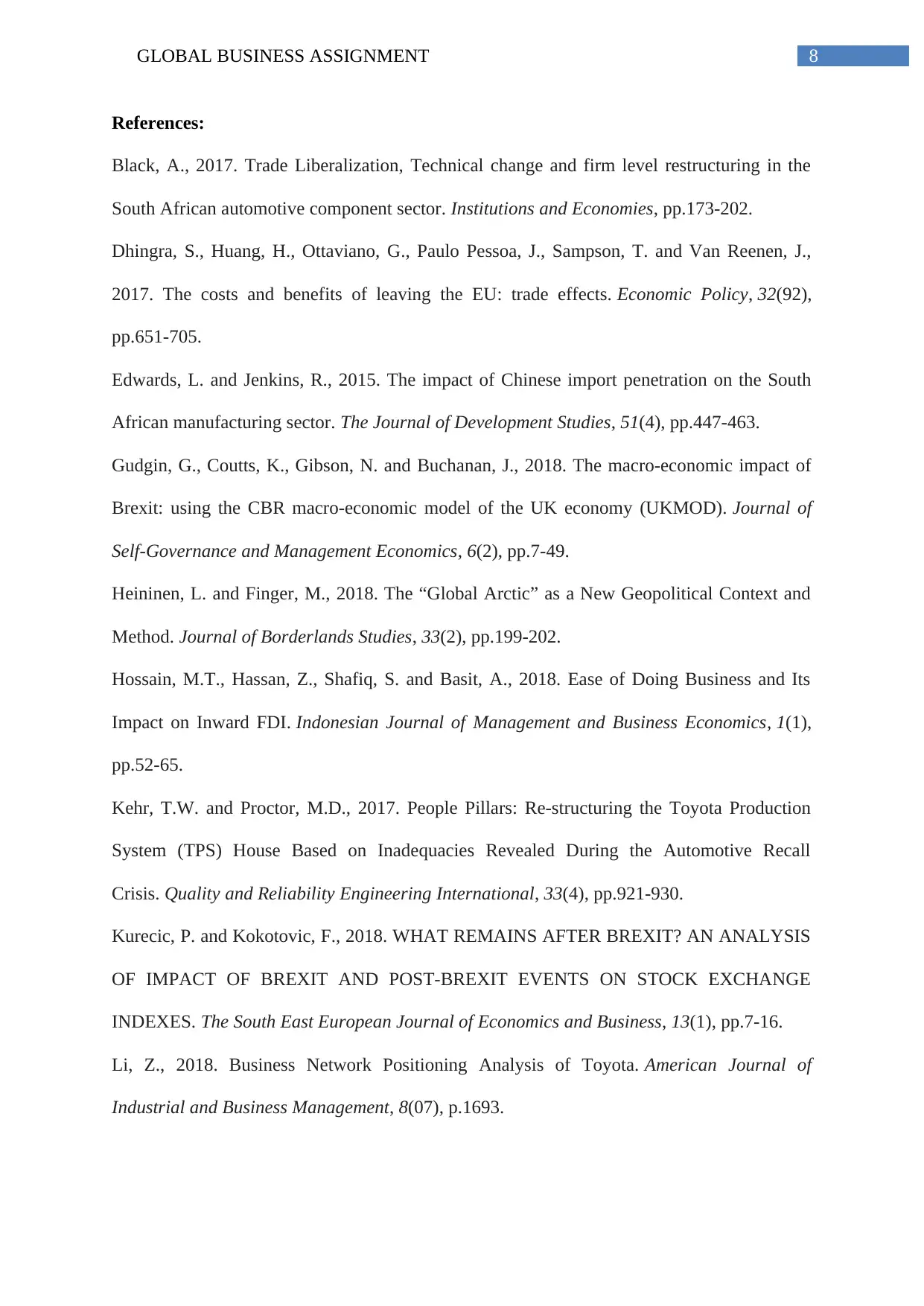
8GLOBAL BUSINESS ASSIGNMENT
References:
Black, A., 2017. Trade Liberalization, Technical change and firm level restructuring in the
South African automotive component sector. Institutions and Economies, pp.173-202.
Dhingra, S., Huang, H., Ottaviano, G., Paulo Pessoa, J., Sampson, T. and Van Reenen, J.,
2017. The costs and benefits of leaving the EU: trade effects. Economic Policy, 32(92),
pp.651-705.
Edwards, L. and Jenkins, R., 2015. The impact of Chinese import penetration on the South
African manufacturing sector. The Journal of Development Studies, 51(4), pp.447-463.
Gudgin, G., Coutts, K., Gibson, N. and Buchanan, J., 2018. The macro-economic impact of
Brexit: using the CBR macro-economic model of the UK economy (UKMOD). Journal of
Self-Governance and Management Economics, 6(2), pp.7-49.
Heininen, L. and Finger, M., 2018. The “Global Arctic” as a New Geopolitical Context and
Method. Journal of Borderlands Studies, 33(2), pp.199-202.
Hossain, M.T., Hassan, Z., Shafiq, S. and Basit, A., 2018. Ease of Doing Business and Its
Impact on Inward FDI. Indonesian Journal of Management and Business Economics, 1(1),
pp.52-65.
Kehr, T.W. and Proctor, M.D., 2017. People Pillars: Re‐structuring the Toyota Production
System (TPS) House Based on Inadequacies Revealed During the Automotive Recall
Crisis. Quality and Reliability Engineering International, 33(4), pp.921-930.
Kurecic, P. and Kokotovic, F., 2018. WHAT REMAINS AFTER BREXIT? AN ANALYSIS
OF IMPACT OF BREXIT AND POST-BREXIT EVENTS ON STOCK EXCHANGE
INDEXES. The South East European Journal of Economics and Business, 13(1), pp.7-16.
Li, Z., 2018. Business Network Positioning Analysis of Toyota. American Journal of
Industrial and Business Management, 8(07), p.1693.
References:
Black, A., 2017. Trade Liberalization, Technical change and firm level restructuring in the
South African automotive component sector. Institutions and Economies, pp.173-202.
Dhingra, S., Huang, H., Ottaviano, G., Paulo Pessoa, J., Sampson, T. and Van Reenen, J.,
2017. The costs and benefits of leaving the EU: trade effects. Economic Policy, 32(92),
pp.651-705.
Edwards, L. and Jenkins, R., 2015. The impact of Chinese import penetration on the South
African manufacturing sector. The Journal of Development Studies, 51(4), pp.447-463.
Gudgin, G., Coutts, K., Gibson, N. and Buchanan, J., 2018. The macro-economic impact of
Brexit: using the CBR macro-economic model of the UK economy (UKMOD). Journal of
Self-Governance and Management Economics, 6(2), pp.7-49.
Heininen, L. and Finger, M., 2018. The “Global Arctic” as a New Geopolitical Context and
Method. Journal of Borderlands Studies, 33(2), pp.199-202.
Hossain, M.T., Hassan, Z., Shafiq, S. and Basit, A., 2018. Ease of Doing Business and Its
Impact on Inward FDI. Indonesian Journal of Management and Business Economics, 1(1),
pp.52-65.
Kehr, T.W. and Proctor, M.D., 2017. People Pillars: Re‐structuring the Toyota Production
System (TPS) House Based on Inadequacies Revealed During the Automotive Recall
Crisis. Quality and Reliability Engineering International, 33(4), pp.921-930.
Kurecic, P. and Kokotovic, F., 2018. WHAT REMAINS AFTER BREXIT? AN ANALYSIS
OF IMPACT OF BREXIT AND POST-BREXIT EVENTS ON STOCK EXCHANGE
INDEXES. The South East European Journal of Economics and Business, 13(1), pp.7-16.
Li, Z., 2018. Business Network Positioning Analysis of Toyota. American Journal of
Industrial and Business Management, 8(07), p.1693.
⊘ This is a preview!⊘
Do you want full access?
Subscribe today to unlock all pages.

Trusted by 1+ million students worldwide
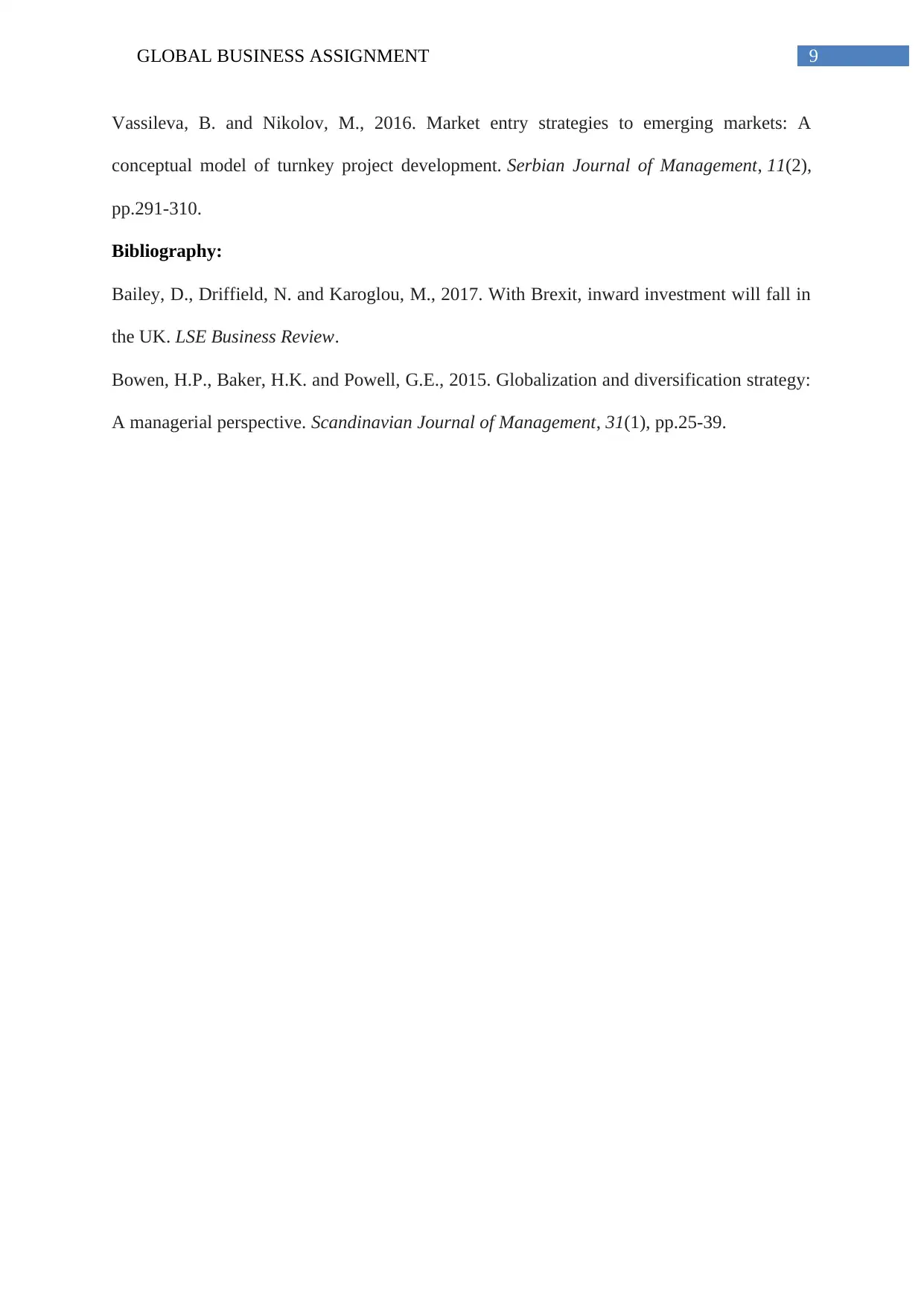
9GLOBAL BUSINESS ASSIGNMENT
Vassileva, B. and Nikolov, M., 2016. Market entry strategies to emerging markets: A
conceptual model of turnkey project development. Serbian Journal of Management, 11(2),
pp.291-310.
Bibliography:
Bailey, D., Driffield, N. and Karoglou, M., 2017. With Brexit, inward investment will fall in
the UK. LSE Business Review.
Bowen, H.P., Baker, H.K. and Powell, G.E., 2015. Globalization and diversification strategy:
A managerial perspective. Scandinavian Journal of Management, 31(1), pp.25-39.
Vassileva, B. and Nikolov, M., 2016. Market entry strategies to emerging markets: A
conceptual model of turnkey project development. Serbian Journal of Management, 11(2),
pp.291-310.
Bibliography:
Bailey, D., Driffield, N. and Karoglou, M., 2017. With Brexit, inward investment will fall in
the UK. LSE Business Review.
Bowen, H.P., Baker, H.K. and Powell, G.E., 2015. Globalization and diversification strategy:
A managerial perspective. Scandinavian Journal of Management, 31(1), pp.25-39.
1 out of 10
Related Documents
Your All-in-One AI-Powered Toolkit for Academic Success.
+13062052269
info@desklib.com
Available 24*7 on WhatsApp / Email
![[object Object]](/_next/static/media/star-bottom.7253800d.svg)
Unlock your academic potential
Copyright © 2020–2026 A2Z Services. All Rights Reserved. Developed and managed by ZUCOL.




